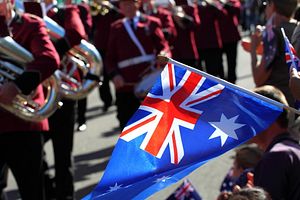What’s the definition of a Soviet historian? A person who can predict the past. In this same week are two grand war anniversaries, both with their own narratives and myths. April 25 saw the 100th anniversary of Gallipoli in Australia, commemorated as Anzac Day and honored with a dawn service for the fallen. Meanwhile, today is the 40th anniversary of the end of the Vietnam War. It is either the Fall of Saigon or Liberation Day (giai phong), depending on your sympathies or location.
The lead up to Anzac was momentous and weeks in advance varied companies and a supermarket chain were cashing in on “Brand-zac,” using war dead to sell more groceries or beer (though the brewer in question, Carlton United Breweries, does donate to servicemen’s charities). Sanctions were not tough but public opinion was merciless in Woolworth’s case.
However, equal anger has been doled out to Special Broadcasting Service football journalist Scott McIntyre who sent a series of tweets reading, variously, “Remembering the summary execution, widespread rape and theft committed by these ‘brave’ Anzacs in Egypt, Palestine and Japan.” and “Wonder if the poorly-read, largely white, nationalist drinkers and gamblers pause today to consider the horror that all mankind suffered.” He was not on duty at the time but was still fired for his “disgusting” tweets, which apparently violated the publicly-funded broadcaster’s social media policy. The veracity of his varied tweets has already been picked apart, though what he said shares much with historian Peter Stanley’s 2010 book Bad Characters: Sex, Crime, Mutiny, Murder and the Australian Imperial Force. Professor Philip Dwyer at the University of Newcastle is also worth reading for a summation of this.
McIntyre did, however, miss a mention of one genuinely controversial war: Vietnam. This, if you remember, was a war where returned servicemen were denied entry to RSLs as it wasn’t really a “war.” Also, soldiers were called far worse things than anything he said.
It is unlikely that there will be any Vietnamese journalists tweeting their unorthodox opinions on North Vietnamese soldiers during the thong nhat (Reunification) celebrations and not simply because it’s not a very popular social media platform in Vietnam. Today heroism is as much an unassailable narrative as ever, even though few born after the war have ever been taught much of what happened. The story in the press remains the same, too: American Imperialists and their puppets. Young people understand the vague shape: civil war, America, Vietnamese victory. They learned the specifics in school, such as how many troops and how much ordnance, assuming they were even paying attention (overcrowded classes and rote learning don’t help). The stories of how the south Vietnamese suffered after 1975 are still uncommon, though money from that diaspora or their educated children eager to do business in the country are now both welcome.
The government is taking the anniversary seriously and the victory over a far larger foreign power remains a point of pride for many people, however. The Ministry of Foreign Affairs has invited back the Western journalists who covered the war and put them up in a three star hotel in the city center. They have, as on previous reunions, given interviews to the press. Large military parades are have been rehearsed all week through the center of Saigon.
That war, or earlier ones, has not been forgotten in Vietnam. But it occupies a different place in public consciousness than it does in America. It is done, won, and life must continue, despite the propaganda which has often been unrelenting in its depictions of heroism at all odds. There are still many legacies, such as unexploded ordnance or MIAs, but the country has not calcified its obsession as America seemed to for so long, even if victory is a way for the Party and government to still maintain authority, as dissidents and some observers say.
So how would the government deal with their own Scott McIntyre? Fire him, obviously. Lock him up, possibly, most probably for abusing his democratic freedoms (article 258 of the criminal code). There is no, so far as I know, actual social media usage contract at media organizations (which are all state-funded, being state-owned) but journalists who have expressed unpopular opinions on private blogs have been sanctioned before. In 2009 reporter Huy Duc was fired from his paper Sai Gon Tiep Thi for a post on his popular blog that was critical of the Soviet Union, once one of Vietnam’s closest allies. He wrote against the purges in East Germany and called the USSR “an occupation force … that deprived people of their basic rights.” There was, of course, deeper meaning in that. Author Bao Ninh’s famous, and beautiful, The Sorrow of War was about just that but thanks to its non-ideological tone was nearly never published. The legions of bloggers and other reporters locked up has been reported on here before, many times. But in both countries the myth making for the war dead and the freedom they fought for continues.
Helen Clark was based in Hanoi for six years as a reporter and magazine editor. She has written for two dozen publications including The Diplomat (as Bridget O’Flaherty), Time, The Economist, the Asia Times Online and the Australian Associated Press.

































